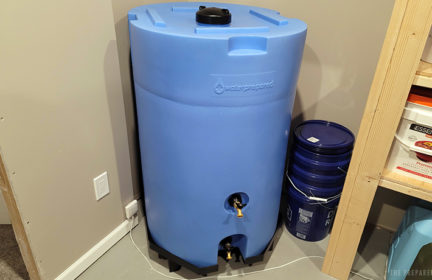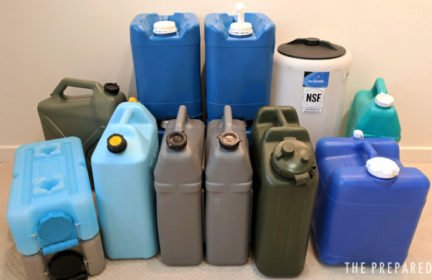Our well was down for a week. General observations.
I live in a rural part of New Mexico, and our well was recently down for a week. Unbeknownst to us, our pressure tank and buried lines were leaking due to the system’s age and were made worse by the recent spate of cold weather much of the country experienced. We currently share a well with our neighbor, and we both have young children and a pregnant spouse. Save for the well shaft and submersible pump, the whole system was torn out and re-done.
General observations
- Last summer, I installed gutters and five 50-gallon rain barrels. This was a good prep! We used this water to flush toilets. Between my neighbor and I, we used about 70 gallons of water to flush toilets.
- Though we have 55 gallons of clean, potable water in reserve, we elected to purchase water from the store for drinking, cooking, cleaning, coffee and tea.
- We went into the City every other day to shower.
- Over the week, we went through several rolls of paper towels. Paper towels were great for wiping down surfaces and drying off hands and cooking implements.
- Since we didn’t have hot water, dishes stacked up like crazy.
- Teflon/non-stick pans were a godsend. To clean them after use, we just added some water, heated it on the stove, then wiped it down with a paper towel. I only cooked with our non-stick pans during the week.
- To get our well back up cost $7,000. My spouse and I regularly contribute to an emergency/rainy day fund, and we have been planning for a well failure for over a decade. We did not feel a burden, because we were financially prepared. Here is an excellent article about financial prepping.
- Lack of running water generally destroyed my work efficiency. It is hard to concentrate when coordinating with well crews, plumbers, inspectors, neighbors and setting aside time to drive into the city for showers, food, and provisions. If you have a busy life, expect a major setback on all of your projects.
Improvements
- I want to store 100 gallons of potable, clean, readily accessible water. We are going to add an additional 55-gallon drum of stored water to our preps.
- I am looking into an on-demand system for hot water and bathing. These systems are used by campers. I will probably write an article about these systems in the future.
- Since we couldn’t easily do dishes, I am going to add some bio-degradable paper plates and bowls to our preps.
- Our rain barrels quickly fill up. This year I plan on burying a thousand-gallon tank under my deck and building an overflow system to drain into the storage tank. That would give us a 1,250 gallons of stored water.
- Since we have a septic tank on our property, I am going to design an outhouse that can be quickly built over one of the septic tank access points. This would save a lot of water since we wouldn’t need to flush toilets. Just build an outhouse with a solar light and a hand washing station, and poo and pee right into the septic tank.
- Certain well components need a heat source to prevent freezing during the winter. I need to find a solar powered heat source to prevent critical well components from freezing in the event of a grid failure.
- Buying a Big Berkey counter top water filter ASAP.
Overall it was a good experience and gave me some data points in the event of a grid failure or catastrophe. Feel free to share your thoughts below.
16
Log in or register to join the conversation
-
Comments (16)
-


